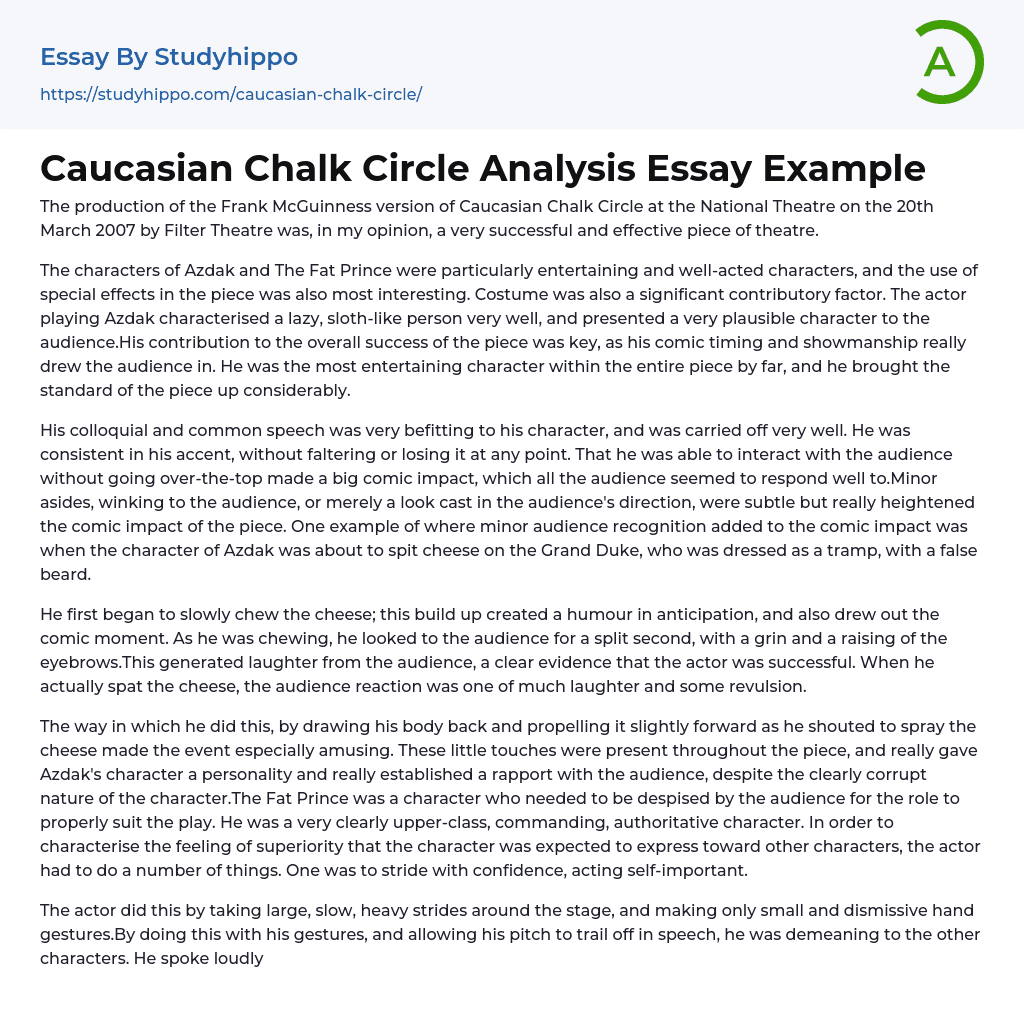As per my assessment, Filter Theatre's rendition of Frank McGuinness' Caucasian Chalk Circle at the National Theatre on March 20, 2007, was an exceedingly triumphant and impactful theatrical presentation.
Highlighted for their entertaining performances and exceptional acting, Azdak and The Fat Prince were standout characters in the production. The use of special effects was also notable and added to the overall interest of the piece. A significant factor in the success of the production was the costume design. The portrayal of Azdak, as a slothful and indolent character, was executed brilliantly by the actor, resulting in a believable and captivating performance for the audience. His timing and showmanship were key components that drew the audience in, making him the most enjoyable character in the entire production and bringing up the standard of the piece substantially.
The
...character's use of colloquial and common language suited his personality and was executed proficiently. He maintained a consistent accent throughout the performance, which added to his comedic effect. The audience responded well to his subtle gestures and acknowledgments, which included minor asides, winks, and looks cast toward them. One instance where this enhanced the comedy was when Azdak prepared to spit cheese on the Grand Duke, who was in disguise as a beggar wearing a false beard.
Starting with a slow chewing of the cheese, the actor built up anticipation and created a humorous moment. As he chewed, he briefly looked at the audience with a grin and raised eyebrows, eliciting laughter from them and demonstrating his success. When he finally spat out the cheese, the audience responded with a mix of laughter and revulsion.
Azdak, the character, entertained the audience with hi
unique antics such as drawing back his body and slightly propelling it forward while shouting to spray the cheese. These touches added personality and helped establish a rapport with the audience despite Azdak's corrupt nature. On the other hand, the Fat Prince was portrayed as an upper-class, commanding figure that needed to be despised by the audience for the play to be effective. To express his superiority, the actor had to showcase confidence and act self-important by striding with authority.
In the performance, the actor portrayed his character's demeaning nature by taking large, slow, heavy strides around the stage and making only small and dismissive hand gestures. Additionally, he spoke in a loud and clear voice with a stereotypical 'posh' British accent and allowed his pitch to trail off in speech. This behavior conveyed an almost childlike joy in issuing orders that most would consider villainous, which made the audience unsympathetic towards him – as was the desired effect. The humor in the piece came from the costumes of the characters, specifically Azdak and the Fat Prince.
Azdak, who often dressed in nothing but underwear, added to his portrayal as a common man when he became a judge by wearing the judge's robe over his vest and underwear. This stark contrast highlighted the unusual nature of Azdak's position and created a comedic effect that made the performance more enjoyable to watch. The actor playing Azdak was able to get laughter from the audience with mere flourishes of the robe, such as taking it on and off or dropping it. Similarly, The Fat Prince's costume effectively portrayed wealth and excess with a purple jacket over white clothes and
a padded stomach area. The many gold-colored trimmings and buttons added to this effect.
The evident padding on the stomach area of the jacket aligns with Brechtian style, where clear rather than subtle features are preferred. This exemplifies Brecht's belief of "letting the process of showing be shown." An instance where special effects enhanced the performance was during Grusha's bathing of Jussup. The actor portraying Jussup was in an onstage bath without water. Instead, as Jussup moved, the Fat Prince actor poured water from a jug into a bucket downstage-right. The process was performed onstage and amplified for the audience to hear. Such a technique aligns with Brechtian Theatre principles and is true to form.
The production was a success thanks to various elements. The actors playing Azdak and the Fat Prince were particularly noteworthy. The costumes also played a crucial role. Additionally, the implementation of Brechtian special effects, such as the sound of water, contributed to an intriguing and entertaining production. These effects also enhanced the tense atmosphere between Grusha and Jussup. While the examples mentioned above were effective in displaying the strengths of the production, there were numerous other moments that were equally effective. Overall, the production successfully stayed true to Brechtian form and kept the audience engaged.
- Marilyn Monroe essays
- Steven Spielberg essays
- Tom Brennan essays
- Nightclub essays
- Theatre Of The Absurd essays
- Playwright essays
- Scotland essays
- Tennessee williams essays
- Actors essays
- Celebrity essays
- Magic essays
- Media essays
- Movies essays
- Music essays
- Roller coaster essays
- Television essays
- Video Game essays
- Aldous Huxley essays
- Alice Walker essays
- Amy tan essays
- Anne Bradstreet essays
- Anton Chekhov essays
- Arthur Miller essays
- Augustine essays
- Bertolt Brecht essays
- Booker T Washington essays
- Carol ann duffy essays
- Charles Dickens essays
- Charlotte Perkins Gilman essays
- Chinua Achebe essays
- Christina Rossetti essays
- Consider The Lobster essays
- Edgar Allan Poe essays
- Elizabeth Bishop essays
- Emily Dickinson essays
- Ernest Hemingway essays
- F. Scott Fitzgerald essays
- George Orwell essays
- Harper Lee essays
- Homer essays
- James Baldwin essays
- Jane Austen essays
- John Donne essays
- John Steinbeck essays
- Kate Chopin essays
- Kurt Vonnegut essays
- Langston Hughes essays
- Leonardo Da Vinci essays
- Mark Twain essays
- Mary Shelley essays




